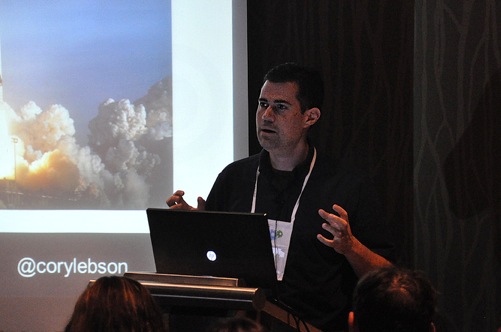While at the User Experience Professionals Association (UXPA) International conference last month in Washington, D.C., I spent a lot of time talking with attendees.
I heard all sort of interesting things there, but one simple comment resonated with me: as an attendee looked around the room, she exclaimed: “These are my people!”
I realized that this is why I’ve attended this conference for the past eight years: these are my people.
While we at the conference didn’t necessarily share a religious, geographic, or perhaps a classic cultural bond, what we did share was UX. And this appreciation for user experience brought us together to learn and to be with others who saw and understood our professional perspectives.
In a recent UX Magazine article, I wrote about UX Adventure, finding value in things that will not necessarily pay in cash, but that can provide new stimulation and visibility. In the article, I mentioned sending Tweets inviting local UX professionals to join me for drinks when I’m traveling. But I’ve also gone further: I’ve taken the opportunity to organize meetups of UX leaders in several cities in order to better understand the value that UX organizations can provide to professionals.
While my initial interest was to gain information that would let me do a better job as the Director of Strategic Partnerships for UXPA International, these meetups also generated insight about what kinds of roles UX organizations can and should play in furthering careers.
Types of UX Organizations
Before describing the value of a UX organizations, it is important to understand the two different types.
Chapter-Based Organizations
UXPA has country-spanning and more granular, within-country regional chapters. While UXPA International provides resources that can quite literally span the globe, the chapters each provide for a more narrowly targeted geographic scope. Other well-known chapter-based organizations include IxDA, IAI, STC, HFES, CHI, and AIGA. If you are in a metropolitan area, it’s likely that one or more of these organizations will have a strong presence.
Local Organizations and Meet Ups
While chapter-based organizations certainly provide a number of communities with UX events and activities, there are also many other independent, local UX organizations. Some can be found on Meetup, while others only distribute information via a separate website, a mailing list, or via social media. (Just do a quick web search, and you’re likely to find several different local organizations around you).
There is, however, one caveat I should mention when calling these all UX organizations: my lens puts user experience as an overarching umbrella term, but that is certainly not universal. While I am grouping all of these organizations together, different organizations frame under different umbrellas, like interaction design, technical communication, and human-computer interaction.
Finding Value
I’ve given a significant amount of time to the larger UX community over the past five years as a UXPA leader. I love having this avenue for growing a wonderful community of UX professionals, both locally and internationally, and appreciate the opportunity to help others in their careers, with knowledge, networking, and infrastructure.
Get out there. Associate yourself with an organization. Your UX career will be stronger for it.
If you’re not already affiliated with a UX organization, I’d encourage you to become involved for so many reasons:
You Can Learn New Things
UX organizations present great opportunities for learning—often providing an event infrastructure; sometimes monthly, sometimes periodically. These events can be virtual or they can be attended in-person. I find the two-way communication and the opportunity to ask questions provides additional value. Find some presentations of interest and get out there. If you can attend a UX-oriented conference, whether regional, national, or international, you’ll find that you get to learn a lot and synch up with current ideas quickly!
If you are an organizational leader, provide an event infrastructure others can use to initiate learning opportunities. This is helpful to both local organizations, and national and international organizations as well. If you are a leader in one of these larger organizations, consider some kind of event infrastructure that supports seed events to gauge interest in locations where you may not have a chapter.
You Can Find Opportunities to Speak
Image courtesy Tom Tullis
Local organizations, whether chapter-based or exclusively local, provide a great forum for speakers to present new ideas and get feedback from their peers. Whether or not you realize it, you absolutely will have something valuable to say that you’ve learned through a current or past project, or perhaps some wisdom that spans multiple projects. Consider offering to speak, or encourage a local org to provide a forum for short talks from attendees. Consider offering to speak at conferences, too. You can start small at local events if you are more comfortable and gradually work up to speaking at larger events.
You can Network
Who you know is often as important to career success as your professional experience and academic background. Organizations provide a quick way to meet many UX professionals very quickly. With UXPA-DC, we always either build networking into events that had a speaker with dedicated time to meet others, or make the networking the event itself—our UX speed-networking efforts, for example.
Take advantage of opportunities that organizations provide for networking, both at a local level and on a larger stage at a conference. Organizational leaders: It’s likely a given that networking is a very salient value-add in your organization, but, if it is not, consider slipping some networking value into educational events and activities.
Find a Mentor/Be a Mentor
While it’s possible that you have great mentors where you work, this isn’t always the case. Organizations can provide formal opportunities for mentors, with a mentoring program that matches mentors with those who seek mentoring opportunities. If you want to be a mentor or need a mentor, check in with some of these organizations. There might be a formal program in place—if not, the organizational leaders may be able to connect you. If you are an organizational leader, consider creating a formal mentoring program that will help provide matches. Organizations can also provide matches for virtual mentors that can be available to bounce ideas off of.
Increase Your Social Media Visibility
Organizations all over the world provide social media groups that you can join. By joining these social media channels you’ll likely have your profile available to others, which is good for visibility, and you’ll be able to quickly find out what is going on all over the globe. Join these channels, and quickly leverage these social media opportunities (for instance, you may be able to learn about job openings from social media). Organizers should make sure that these channels are available and easy to find and that they contain as many affiliated UX-ers as possible, which will increase their value to your community.
Exposure to Broader UX Culture
UX organizations provide an opportunity to learn the lingo. You can assess jargon or methods specific to your workplace and what terms and methods other professionals are using as well. Find out how others with your job type do their work and learn from them.
Become an Organizational Leader
Getting involved in different types of organizations can also open up fantastic leadership opportunities. If you’re not a leader in a UX organization already, become a leader! You’ll get to help other UX professionals by leveraging the power of the organization. And you’ll discover that you will often get as much as you give: rapid access to the heart of an incredible UX community, as well as information, activities, and a network that will help you in your own career.
Advice to Organizational Leaders
Just under a year ago, I blogged about lessons learned being a UX leader. Much of this blog post was focused on creating the opportunities described above, tweaking the organizations to find ways of bringing in participants and sponsors and running more efficiently.
One of the most important lessons learned, however, was the importance of partners. Whether you are a local org, a national org, or an international org, don’t do it alone. Figure out ways to partner with similar organizations. You’ll discover that you and your partner organizations are all stronger for it, and you will all maximize your ability to have an impact.
Consider joint events (both in person and virtual), opportunities for networking across organizations, shared discounts, cross-organizational mentoring programs, shared speakers, and shared web-based calendars so that those who look up events for one organization can find out what is happening elsewhere.
It May be Scary—Do it Anyway
Getting out some evening to an organizational event or activity may seem scary or time-consuming. You may not know anyone. You may be tired after a long day at work. Going to a new national or international conference may also be intimidating, but other UX-ers want to meet you. They want to teach you things and they want to learn from you. Get out there. Associate yourself with an organization. Your UX career will be stronger for it.
Image of raised fists courtesy Shutterstock





